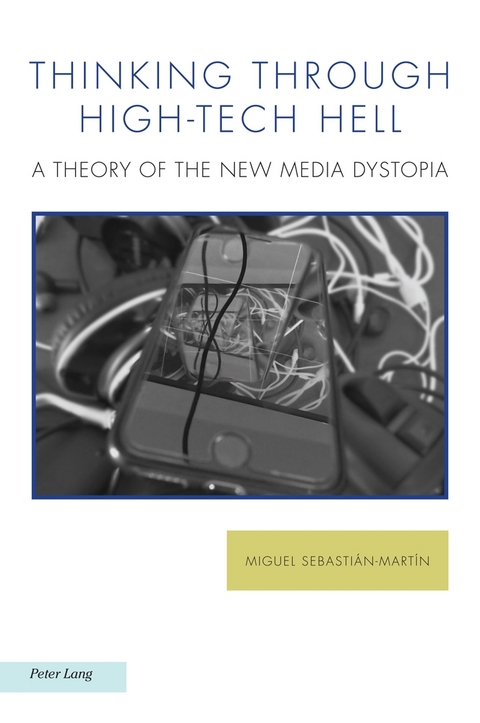
Thinking through High-Tech Hell
Peter Lang International Academic Publishers (Verlag)
978-1-80374-462-9 (ISBN)
«New media determine our dystopian situation. Miguel Sebastián-Martín maps the new media hell. Read this book to understand how SF reproduces our dystopian present and to find the cracks where the light gets in.»
(J. Jesse Ramírez, Eastern Switzerland University of Applied Sciences)
«In Thinking through High-Tech Hell, Miguel Sebastián-Martín defines a ‘dystopian structure of feeling’ among SF and new media that, contrary to much recent theorizing, is ambivalent about its sense of dystopianness. Through a series of textual examples, Sebastián-Martín demonstrates how the dystopian structure of feeling both critiques and embraces the current neoliberal capitalist state of technology and new media. The book is impressively researched and thoughtfully written, moving easily from broad theoretical/philosophical discussions to pinpoint analysis, making it a relevant new contribution to new media studies and SF research.»
(Liz W. Faber, Assistant Professor of English and Communication, Dean College)
Examining a cluster of British and Anglo-American series from the 2010s, this book theorizes them — and, indirectly, the epochal reality that they represent — as «new media dystopias.» With this term, the author conceptualizes an emergent sub-genre of audio-visual SF which is thematically concerned with the worst effects of developments in media technologies under digital capitalism and is, ironically, produced for and distributed through digital-capitalist platforms. Across the book’s chapters, the new media dystopia is approached as an epochal structure of feeling, as a narratively reflexive sub-genre, as an aesthetically ambivalent form, and as a locale for a new kind of quixotism. Combining these perspectives, the book’s interest lies in gauging the ways and the extent to which these dystopias contribute to the historical hopelessness that seems to define the terms of our relationship with new media technologies — as well as our position within and towards contemporary capitalism.
Miguel Sebastián-Martín is a postdoctoral researcher and teacher in the English Department at Universidad de Salamanca, where he also completed his PhD thesis, having previously taken an MPhil in Film and Screen Studies at the University of Cambridge. His research focusses on Anglophone speculative fiction in audio-visual media.
Contents: Introduction: Feeling Dystopian? – Our Hopeless SF Times: Contemporary Capitalism as a New Media Dystopia – New Media Reflexivity: Self- Referentiality and Self-Consciousness in the Audio-Visual SF of Digital Platforms – Between Critique and Mystification: The Aesthetic and Ideological Ambivalences of New Media Dystopias – New Media Quixotism: Satiric and Utopian Characterizations of Digital Subjectivity – Conclusion: Exit Dystopia?.
| Erscheinungsdatum | 22.08.2024 |
|---|---|
| Reihe/Serie | Ralahine Utopian Studies ; 35 |
| Mitarbeit |
Herausgeber (Serie): Michael G. Kelly |
| Zusatzinfo | 26 Illustrations |
| Verlagsort | Oxford |
| Sprache | englisch |
| Maße | 152 x 229 mm |
| Gewicht | 576 g |
| Themenwelt | Literatur ► Romane / Erzählungen |
| Kunst / Musik / Theater ► Film / TV | |
| Geisteswissenschaften ► Sprach- / Literaturwissenschaft ► Anglistik / Amerikanistik | |
| Sozialwissenschaften ► Kommunikation / Medien ► Medienwissenschaft | |
| ISBN-10 | 1-80374-462-6 / 1803744626 |
| ISBN-13 | 978-1-80374-462-9 / 9781803744629 |
| Zustand | Neuware |
| Informationen gemäß Produktsicherheitsverordnung (GPSR) | |
| Haben Sie eine Frage zum Produkt? |
aus dem Bereich


